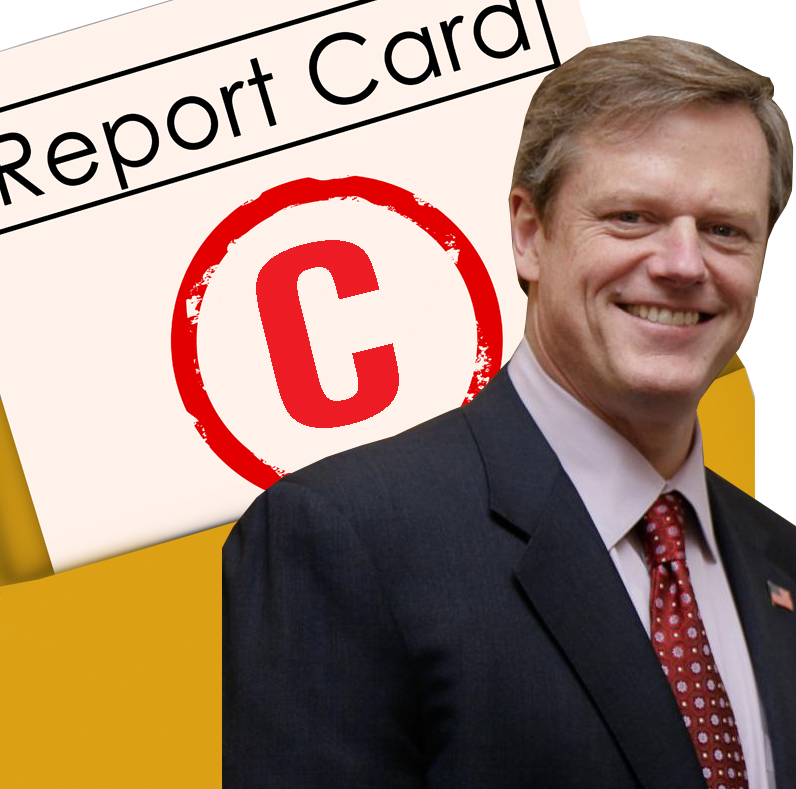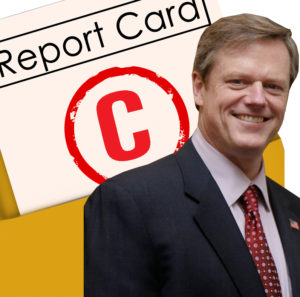Gov. Charlie Baker’s administration has been deemed mediocre – receiving a “C” for the second year in a row for its environmental policies and leadership, according to a report card from seven leading environmental organizations.
“Unfortunately, once again we are seeing the Baker Administration fall short. From climate preparedness to toxic landfill emissions, there are serious challenges ahead for our state, and it’s critical that the Governor devote his time, resources and political willpower to taking them on,” Carol Gregory, Interim Massachusetts Director for the Conservation Law Foundation, said.
In an age where facts are dismissed easily by a willfully ignorant Trump administration that orders the Environmental Protection Agency to remove information about climate change from its website, we need leaders, especially conservatives, who use logic and are able to look at the bigger picture.
The Baker administration’s mediocre grade matters. It shows that progress on environmental issues hasn’t been a priority for the governor.
Individual grades in the composite report card included an “A” for the administration’s work on a food waste ban and a “B+” on energy efficiency, land conservation, and electric vehicles. However, other scores were not so kind. Baker’s administration received a “D-” for solid waste data collection and a “D” for gas pipelines, reducing greenhouse gas emissions from the transportation sector, water pollution, and decreasing the amount of solid waste in the Commonwealth.
In a statement to the Advocate, Peter Lorenz, communications director for the Executive Office of Energy and Environmental Affairs, said the Baker-Polito Administration is committed to the Commonwealth being a leader in combating climate change – the state is on track to reduce greenhouse gas emissions by 2020.
“Governor Baker’s climate change executive order, bipartisan energy legislation, commitment to the Commonwealth’s natural resources and open spaces, expanding access to public lands and outdoor opportunities for urban youth, and the recent proposal to take control over critical environmental protections from the Trump Administration will increase environmental protection and resiliency while securing a clean energy future for the Commonwealth,” Lorenz said.
Bob Zimmerman, executive director of the Charles River Watershed Association said climate change shouldn’t be viewed as just a greenhouse gas issue and that other environmental factors must be considered.
“We will suffer the impacts in water: way too much, way too little, overheated, and surging. Addressing climate change requires a far better understanding of the water impacts and how we can manage them for resiliency and adaptation,” he said.
Baker officials countered that in fiscal year 2017 the administration awarded more than $1.8 million in grants to 19 communities to support coastal and ecosystem resilience efforts. The funding is aimed at preparing and reducing impacts related to climate change such as storm surges, flooding, erosion, and a rising sea level.
The authors of the report acknowledged slight improvements in land protection, energy efficiency, and reducing the use of toxic chemicals in the state. However, in many areas the state remained static on issues.
“We added a number of new important and timely issues along with a new section on solid waste. This year, we sought out a number of knowledgeable outside stakeholders including municipal representatives, legislators, energy experts, academics, and policy innovators. We asked them about their views on priorities and their sense of how or whether the administration was making progress,” the report states.
According to the report card, the Baker Administration received its lowest rating for solid waste collection because MassDEP has stopped tracking key metrics due to staff shortages. Without data, the report asserts that it is impossible to ascertain whether the Commonwealth is on a pathway to zero waste. MassDEP tracked waste collection comprehensively until 2013. In that year the agency did not release any numbers and in 2014 and 2015 the data released was not as comprehensive as in the past.
The seven organizations that assessed the Baker administration include the Charles River Watershed Association, Clean Water Action, Conservation Law Foundation, Environmental League of Massachusetts, Environment Massachusetts, Massachusetts Rivers Alliance and Massachusetts Sierra Club.
“We recognize that some of the concerns raised in this assessment existed prior to the Baker Administration coming into office. That said, the Baker Administration is now in charge and responsible for carrying out the state’s work on environment and energy issues,” the report reads.
Be on the right side of history, Charlie.
The Baker administration should focus on generating more wind and solar; not fostering relationships with fossil fuel companies. Oil is a finite resource and that’s not going to change, no matter what your report card grade is.
Contact Chris Goudreau at cgoudreau@valleyadvocate.com
Full report below:
Baker’s 2017 Environmental Report Card by Newspapers of New England on Scribd




